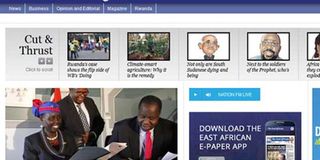US raises concern over Tanzania's ban on ‘The EastAfrican’

The EastAfrican newspaper has been banned from circulation in Tanzania, 20 years after it was launched to cover the region. PHOTO | NATION MEDIA GROUP
What you need to know:
- The US called upon the Tanzanian government "to make every effort to improve freedom of the press in Tanzania."
- The US statement on Sunday said Washington agreed with concerns raised by the European Union on the ban.
NEW YORK
The United States said on Sunday it is "concerned" about the move by Tanzanian government to ban circulation of The EastAfrican.
"A free and open press is essential to the development of democracy and a free and vibrant society," a State Department official said.
The US called upon the Tanzanian government "to make every effort to improve freedom of the press in Tanzania."
"We also stress the need for the Tanzanian government to continue its work towards passage and implementation of the Media Services and the Right to Information Bills," the official added.
The official said the two legislations should recognise the rights to freedoms of expression and opinion and as well as importance of a free press.
UNDEMOCRATIC
Tanzanian authorities said in a letter dated January 23 that the action was being taken because the 20-year-old paper “has been circulating in the country without being properly registered, contrary to section 6 of the Newspaper Act number 3 of 1976."
Nation Media Group chairman Wilfred Kiboro protested the move as "unfair and undemocratic."
Prior to the ban notice, Tanzania Director of Information Services Assah Mwambene had summoned Dar bureau chief Christopher Kidanka and told him the newspaper endorsed a "negative agenda against Tanzania".
Mr Mwambene was also said to have criticised the paper's reporting and analysis, including its opinion articles, and its publication of a satirical cartoon depicting President Jakaya Kikwete.
The US statement on Sunday said Washington agreed with concerns raised by the European Union on the ban.
Vienna-based International Press Institute also voiced concern over the move by Mr Kikwete’s government.




